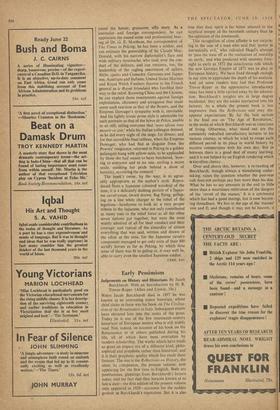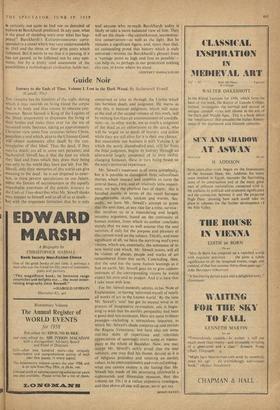Early Pessimism
Judgements on History and Historians. By Jacob Burckhardt. With an Introduction by H. R.
Trevor-Roper. (Allen and Unwin, 18s.)
WHEN Jacob Burckhardt died in 1897 he was known as an interesting minor historian, whose chief claim to fame was his book on The Civiliza- tion of the Renaissance in Italy. Subsequent events have elevated him into the ranks of the great. Today he is one of the few nineteenth-century historians of European stature who is still widely read. Not, indeed, on account of his book on the Renaissance or of others published during his life, all of which have been overtaken by modern scholarship. The works which have made so great an impact are of a different kind, philo- sophical and prophetic rather than historical; and it is their prophetic quality which has made them famous. The one is the Reflections on History, the other its companion, the present volume, now appearing for the first time in ,English. Both are posthumous, gleanings from Burckhardt's lecture notes; and the fact that they became known at so late a date—the first edition of the present volume only appeared in 1929—accounts for the sudden growth in Burckhardt's reputation. But it is also true that their spirit is far better attuned to the sceptical temper of the twentieth century than to the optimism of the nineteenth.
This recognition of close affinity-is not surpris- ing in the case of a man who said that 'power is intrinsically evil,' who ridiculed Hegel's attempt to 'pass the state off as the realisation of morality on earth,' and who predicted with uncanny fore- sight as early as 1872 the cataclysmic role which the new German Empire of 1871 was to play in European history. We have lived through enough in our time to appreciate the depth of his analysis. And yet some readers may feel that Professor Trevor-Roper in the appreciative introductory essay has been a little carried away by his admira- tion. Burckhardt's insights are in large degree incidental; they arc the asides interjected into his lectures. As a whole the present book is less impressive than the Reflections and may dis- appoint expectations. By far the best section is the final one on 'The Age of Revolution,' in the midst of which Burckhardt was so conscious of living. Otherwise, what stand out are the constantly redrafted introductory lectures to his various courses, in. which he tried to range each different period in its place in world history by incisive comparisons with his own day. But in between there is a good deal of musty learning, and it is not helped by an English rendering which is too often clumsy.
Over and above this, however, a re-reading of Burckhardt, though always a stimulating under- taking. raises the question whether the post-war cult does not perhaps pay him more than his due. What he has to say amounts in the end to little more than a wearisome reiteration of the dangers of the 'revolt of the masses.' It is a catchword which has had a good innings, but is now becom- ing threadbare. We live in the age of the 'masses' you and 1), and though it may not be heaven, it is certainly not quite so bad nor so denuded of culture as Burckhardt predicted. In any case, what is the good of shedding tears over what has hap- pened? Burckhardt's Kuhurpessimismus corre- sponded to a mood which was very understandable in 1945 and the three or four grim years which followed. But it seems to me that it is passing, if it has not passed, to be followed not by easy opti- mism, but by a pretty cool assessment of the possibilities a technological civilisation holds out;
and anyone who re-reads Burckhardt today is likely to take a more balanced view of him. They will see the shade—the cantankerous, unconstruc- tive conservatism—as well as the light. But he remains a significant figure, and, more than that, an outstanding proof that history which is truly universal—written (in Burckhardt's phrase) from a 'vantage point as high and free as possible'— can help us, as perhaps in our generation nothing else can, to know where we stand.
GEOFFREY RARRACLOUGH







































 Previous page
Previous page